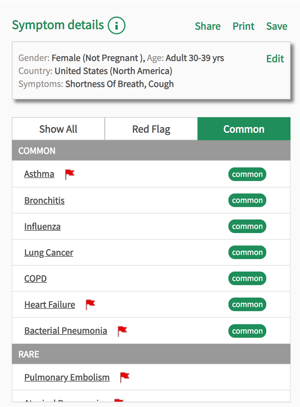- Privacy Policy
- Terms & Conditions
- Contact us
- ©Isabel Healthcare 2025
What is wrong with my lungs? 5 lung conditions to be aware of
 We all know that our lungs are a vital organ, necessary to keep us alive, and if we don’t have a medical career, we can probably remember some of the information we were taught at high school and that’s about it. Something to do with aioli? Or is that the garlic dip? The good news is that for our bodies to work, we don’t need to know what they’re doing, they are able to function by themselves. But what happens when we get a pain, a rash, or an ache that we’ve never had before, and our body is unable to work as well as it usually does? With something as vital as the lungs, this can be quite alarming, and we suddenly wish we’d paid more attention in biology class. Difficulty breathing and pains in our chest are definitely not symptoms to be ignored, and knowing what the symptoms mean, how to spot them, and what to do next is really important. You should always talk to your doctor if you have any new symptoms that don’t go away, but researching the symptom yourself with a credible symptom checker can really help you and your doctor to reach a diagnosis quicker. Here are the most common causes of problems in your lungs and their symptoms.
We all know that our lungs are a vital organ, necessary to keep us alive, and if we don’t have a medical career, we can probably remember some of the information we were taught at high school and that’s about it. Something to do with aioli? Or is that the garlic dip? The good news is that for our bodies to work, we don’t need to know what they’re doing, they are able to function by themselves. But what happens when we get a pain, a rash, or an ache that we’ve never had before, and our body is unable to work as well as it usually does? With something as vital as the lungs, this can be quite alarming, and we suddenly wish we’d paid more attention in biology class. Difficulty breathing and pains in our chest are definitely not symptoms to be ignored, and knowing what the symptoms mean, how to spot them, and what to do next is really important. You should always talk to your doctor if you have any new symptoms that don’t go away, but researching the symptom yourself with a credible symptom checker can really help you and your doctor to reach a diagnosis quicker. Here are the most common causes of problems in your lungs and their symptoms.
Cold and flu
We’ve all experienced a cold, and the majority the flu, and it’s not fun. We’ve written about cold vs flu and how to tell the difference before, so you can read up more there. Colds and the flu are not usually life threatening, unless you have a weakened immune system where complications can arise. If you’re normally fit and healthy, a common cold should last around a week, with some diminishing symptoms lingering for up to 2 weeks. The flu comes with extra symptoms thrown in such as muscle aches, exhaustion, sickness, and fever, and all symptoms are much more intense. Flu can last 1-3 weeks. Both, however, are viral infections and so usually don’t have any specific treatment that a doctor can prescribe. Rest, fluids, and over-the-counter remedies such as painkillers and decongestants are the way to go. If symptoms persist past the time frames above, the virus could have transitioned into an infection, at which point you may require antibiotics to fight that. Chest infections are common, so if a cough isn’t going away and you’re still producing green or yellow phlegm, it’s time to see your doctor. Likewise, what you thought was a cough could be something more serious, so if you don’t get better, book an appointment.
Asthma
Asthma is a chronic lung condition that is usually diagnosed in childhood but, contrary to popular belief, can occur at any time in your life. It involves the airways, individually called the trachea, bronchi, bronchioles, becoming inflamed and swollen, meaning air can’t pass through so easily. This means the alveoli (not aioli) can’t absorb as much oxygen as they need and the the blood, heart and the rest of the body suffers. The inflammation is an auto-immune response, and can be triggered or worsened by allergens, changes in temperature, exercise and even stress. Wheezing, a persistent tickly cough, tightness around the chest, and running out of breath are all symptoms of asthma. If you think you or your child may be suffering from asthma, place the symptoms into the Isabel Symptom Checker and get the results checked out by a doctor. Here's our blogpost on asthma where we go into a little more detail.
Bronchitis
This can occur after or during a cold or the flu virus, or it can come on of its own accord. Bronchitis used to be a deadly condition in the days of Jane Austen, and many people are still scared of it, but nowadays most cases of bronchitis can be treated and people go on to recover fully. Bronchitis occurs when the airways become inflamed, similar to asthma, but they are 2 different conditions. Asthma is a chronic condition that comes and goes depending on triggers, whereas bronchitis is usually an acute infection, either viral or bacterial, and will only last for a few weeks at most. All the symptoms of a cold are present, such as a runny nose, a cough, a sore throat, and in some cases a fever. It does last a little longer than a cold and if bacterial, may need antibiotics. It's also important to note that bronchitis is most common in children under the age of 5, so watch out for lingering colds in your children.
Pneumonia
In this one, it is the alveoli that become inflamed rather than the airways. It can be caused by a virus, bacteria, or even a fungus, and causes the alveoli, which are usually just filled with air, to become full of pus and fluid. Symptoms include coughing up a very thick mucus, struggling to breath, and usually a fever as well. Pneumonia can be quite serious and you may need a stay in hospital, so you can be monitored and cared for while the infection is treated.
Lung cancer
Lung cancer is the most common form of cancer worldwide, with over 2 million diagnoses in 2018. Symptoms are similar to those of much less serious conditions, so sadly a lot of the time it doesn’t get diagnosed at an early stage and survival rates are low once it reaches a late stage and spreads. Here’s our in depth post on lung cancer, but symptoms that you really should get checked out by a doctor include:
- A cough that has last longer than 2-3 weeks
- Blood in your mucus
- Chest pains or tightness
- Unexplained weight-loss
- Tiredness
- Difficulty breathing
- Chronic chest infections
85% of those with lung cancer are or were smokers at some point in their life, and this is considered the main cause. Other lifestyle choices, such as your weight and diet, can also increase your risk of lung cancer, and other lung diseases too, so improving your lifestyle and quitting smoking are your first steps if you want to decrease your risk.
There are many more conditions that affect our lungs, but that would be an extremely long blogpost. The 5 we’ve picked out are either extremely common or shouldn’t be ignored, but if you have any symptoms at all concerning your lungs, we reiterate that you should discuss this with your doctor. Placing the symptoms into Isabel Symptom Checker can give you lots of information so you can ask the right questions and reach the correct diagnosis with your doctor.

Mandy Tomlinson
Mandy has worked for Isabel Healthcare since 2000. Prior to this, she was a Senior Staff Nurse on the Pediatric Infectious disease ward and high dependency unit at one of London's top hospitals, St Mary’s in Paddington which is part of Imperial College Healthcare NHS Trust. Her experience in the healthcare industry for the past 33 years in both the UK and USA means she's a vital resource for our organization. Mandy currently lives and works in Scottsdale, Arizona.
Subscribe Here!
Recent Posts
Isabel DDx Companion with ChatGPT Integration - to help you diagnose even faster
At Isabel Healthcare, we’ve always been driven by one goal: to make clinical reasoning faster,..Virtual Triage: Do more questions lead to better patient outcomes?
One of the common misconceptions related to virtual triage / symptom checker tools is that the more..List Of Categories
- Differential Diagnosis Decision Support
- Differential diagnosis
- Symptom Checker
- Symptoms
- Medical Error
- Patient Disease Information
- Disease
- Clinical Decision Support
- Diagnostic Decision Support
- Isabel 1 Minute Read
- Diagnosis Error
- Diagnosis Skills Cases
- Healthcare Informatics
- Clinical Reasoning
- Evidence-based Medicine
- Medical Education
- Patient Engagement
- Symptom Triage
- Nurse Practitioner Education
- Nursing Decision Support
- Partnership
- Public Health
- COVID-19
- EHR
- Patient Empowerment
- Patient Safety
- rare disease

Start your FREE Trial today
Try the Isabel Pro DDx generator for 30-days - no payment card details required.




